Redditor Threatens to Take the Family’s Cat to a Shelter After Divorce
Often, when a family decides to adopt a pet, no one in the family forms a strong bond with the animal, leading to mistreatment due to a lack of willingness to invest the necessary time. Problems arise when the children move out of the family home, and if they don't take the pet with them for any reason, it remains with the parents, who may not want to dedicate the time needed to properly care for the cat.
When situations like this occur, one cannot help but feel sympathy for the pet, as it lives in an environment where it is not receiving the unconditional love it is ready to give its owners. This is the predicament this Redditor found herself in after divorcing her husband, with everyone going their separate ways and leaving the cat in the care of OP, who did not want to take responsibility for it.
Her husband wanted nothing to do with the cat after the divorce, and her two daughters, who ended up living together, promised her that they would take care of the cat but needed more time. OP waited two years for her daughters to come and take the cat, but they never appeared, leaving her with no choice but to threaten them with taking the cat to a shelter.
She informed them that they had two months to come and get the cat, or it would end up in a shelter. However, after two months of waiting, the daughters did not show up. This left OP with no choice but to find a new home for the cat, although she did not take it to a shelter as she had threatened.
It seemed that the daughters never cared about the cat, as they never inquired about its well-being. OP is uncertain about her actions, so she turned to Reddit to seek validation on whether she did the right thing. Scroll down to read the entire story and see what other Redditors commented on the thread.
OP hated the cat, but she still took care of it alone for more than two years because no one else wanted to be bothered.
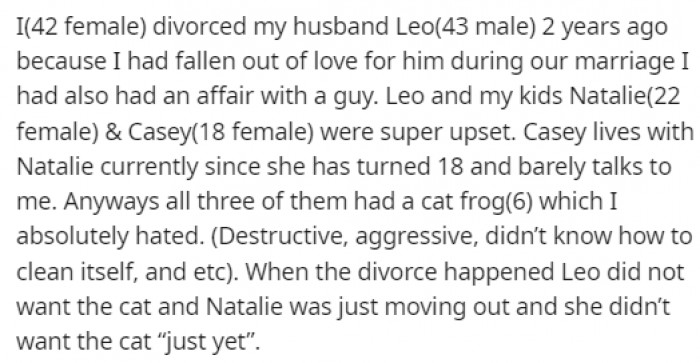
Natalie told her that she would come and take the cat away with her, but that never happened.

She told her daughters that they had two months to come get the cat, or it would end up in a shelter.
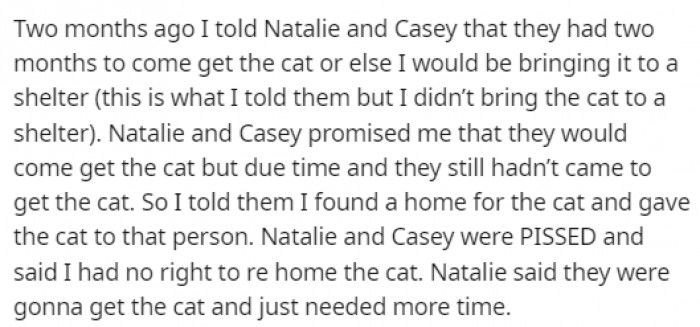
When families go through a divorce, emotional turmoil can impact decisions about pet care. Research published in the Journal of Family Psychology highlights that pets often serve as emotional anchors during stressful times. This attachment can lead to neglect if family members feel overwhelmed and prioritize their emotional needs over the well-being of the pet.
Understanding this dynamic can help families navigate the emotional complexities of pet ownership during transitions.
The Emotional Impact of Pets
Pets play a significant role in providing emotional support and companionship, especially during family upheavals like divorce. Studies show that pet ownership can reduce feelings of loneliness and depression, contributing positively to psychological well-being.
Dr. Allen McConnell, a researcher at Miami University, emphasizes that pets can serve as social catalysts, promoting interactions that enhance emotional resilience. Keeping the pet within the family unit can mitigate some of the negative emotional impacts of divorce.
The Emotional Toll of Divorce on Pets
The decision to take a family cat to a shelter reflects the emotional turmoil often associated with divorce. Research shows that pets can experience stress during family transitions, leading to behavioral issues.
Dr. Lisa Green, a veterinary behaviorist, emphasizes that pets are sensitive to changes in their environment and can be deeply affected by their owners' emotional states.
After more than two years, Natalie said that she needed more time, but OP wasn't buying it.

She ended up rehoming the cat instead of taking it to a shelter.
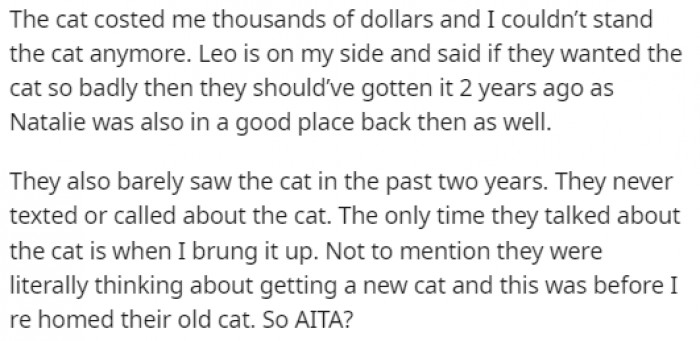
People were conflicted in the comments of this thread.
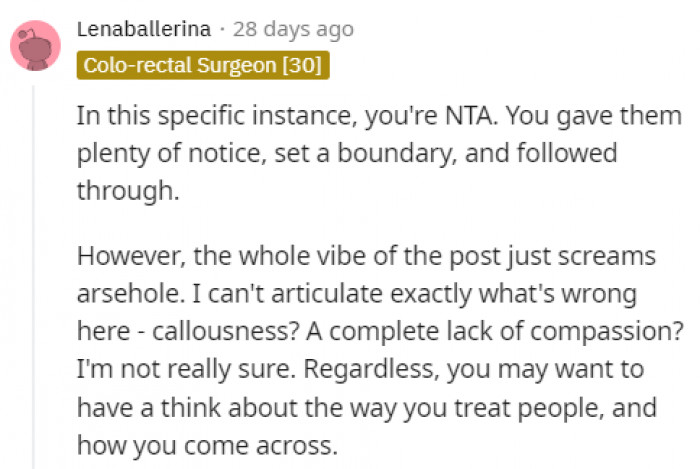
The Need for Responsibility
Many families underestimate the commitment required for pet ownership, which can lead to neglect or abandonment. As Dr. Michael Thompson, a child psychologist, notes, "Pets can teach children invaluable lessons about empathy and responsibility, but these lessons require ongoing commitment from the entire family." However, if children move out and leave their pets behind, parents may struggle to maintain that responsibility, leading to potential neglect, as highlighted by Daniel Goleman, an emotional intelligence expert, who states, "The emotional bonds we form with pets can be profound, and their care should not be taken lightly."
This situation also highlights the challenges of co-parenting during a divorce. Studies indicate that unresolved conflicts can lead to added stress for both parents and pets, further complicating the situation.
Understanding these dynamics is crucial for creating a supportive environment for pets during transitions.
It seems that most people agree with this perspective.
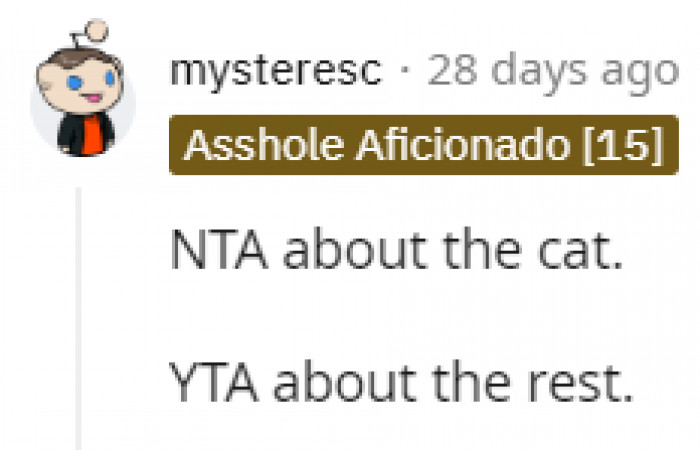
Unreliable narrator.
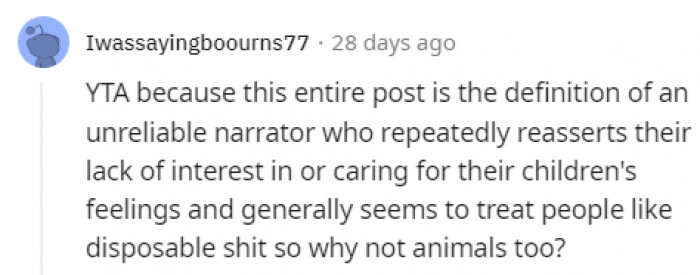
The cat deserves a proper home where it will be loved.
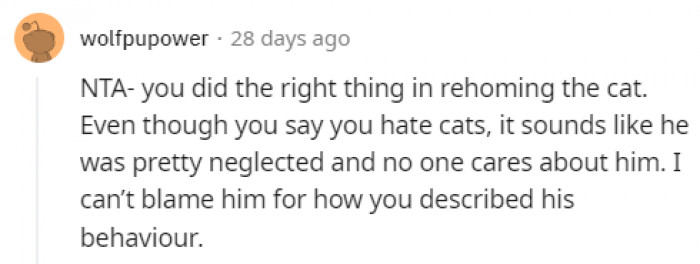
It's essential to foster a strong bond between family members and their pets. Research indicates that engaging in shared activities, such as regular walks or playtime, enhances emotional connections, which in turn improves overall mental health for both the pet and the caregiver.
Therapists recommend creating a family schedule for pet care, ensuring everyone participates and shares the responsibility. This can foster accountability and emotional investment in the pet's well-being.
The Importance of Stability During Transitions
Providing a stable environment for pets during family transitions is essential. Research from the Journal of Applied Animal Welfare Science highlights that maintaining routines can help alleviate stress for pets.
Creating a sense of normalcy can benefit both pets and owners during challenging times.
Interesting perspective.

It's sad to see that no one wanted anything to do with the poor cat, and it seems unfair to the daughters to keep OP waiting and force the cat to live in a non-loving home. Redditors had many differing opinions in the comments, but we want to know how you feel about this.
Additionally, exploring co-parenting strategies can help ensure that pets receive adequate care during and after divorce. Open communication between ex-partners can facilitate better decision-making regarding the pet's welfare.
Research supports that cooperative co-parenting can lead to more positive outcomes for all involved.
Practical Steps for Supporting Pets During Divorce
To support pets during a divorce, consider establishing a shared custody agreement that prioritizes their well-being. Regular check-ins between co-parents can ensure that both parties are aligned on the pet's needs.
Additionally, maintaining routines, such as feeding and exercise schedules, can help provide stability for the pet during this transition.
Psychological Analysis
This situation highlights the often-overlooked emotional needs of pets during family transitions. It's essential for owners to recognize that their pets can experience stress and anxiety during such changes and to take steps to support their well-being.
Analysis generated by AI
Analysis & Alternative Approaches
Understanding the emotional impact of divorce on pets is crucial for ensuring their well-being during transitions.
By fostering open communication and prioritizing stability, owners can create a nurturing environment for their pets.
In summary, the intersection of family dynamics and pet ownership during times of transition is complex and deserving of attention. Psychologists emphasize the importance of responsible pet care and the emotional benefits pets provide. Effective communication and shared caregiving responsibilities can foster healthier family relationships and ensure pets receive the care they need. Ultimately, recognizing the emotional importance of pets can lead to better outcomes for families navigating difficult changes.



